Bridging the Gap: A Decade of Knowledge in One Freely Accessible Guide In our last post, we introduced the One Guide. One Goal. campaign—a grassroots effort to raise $500,000 to distribute the Bateman Horne Center’s (BHC) Clinical Care Guide to healthcare...
Patient Education
The Youngest Victims: A Mother’s Perspective on Long COVID Research and the ME/CFS Reality We’ve Lived
As a mother who has watched my child suffer with ME/CFS for ten years, I felt a complex mix of validation and heartbreak reading the groundbreaking study published in JAMA Pediatrics. Finally, researchers are documenting what I've witnessed firsthand: viruses can...
A Roadmap to Better Care
A Roadmap to Better Care: Clinical Care Guide for ME/CFS, Long COVID & Infection-Associated Chronic Conditions Introducing the Clinical Care Guide for ME/CFS, Long COVID & Infection-Associated Chronic Conditions For individuals living with ME/CFS, Long COVID,...
Knowledge Shared, Lives Changed through MERC
The Medical Education Resource Center (MERC) was founded by Open Medicine Foundation and Bateman Horne Center to inform clinicians about ME/CFS and other complex infection-associated chronic conditions.
Reflections on the 2024 Mast Cell Masterminds Conference
Reflections on the 2024 Mast Cell Masterminds Conference By Melanie Hoppers, M.D. Last month, I had the opportunity to attend the 2024 Mast Cell Masterminds Conference in Oregon with my Bateman Horne Center colleagues, Dr. Brayden Yellman and Jennifer Bell, FNP-C....
Living with Orthostatic Intolerance (OI)
Living with Orthostatic Intolerance (OI) by Melanie Hoppers, MD If you’ve ever felt like simple, everyday activities drain your energy, you’re not alone. Living with orthostatic intolerance (OI) can turn activities like standing in line, taking a shower, or even...
The Story Behind “Life with a Low Battery: Living with ME/CFS”
The Story Behind "Life with a Low Battery: Living with ME/CFS" I am thrilled to announce the release of our latest educational video, Life with a Low Battery: Living with ME/CFS. This video was created not just to educate, but to amplify the voices of those...
How to Be a Demanding Diplomat as a Severe ME/CFS Caregiver
Galen Warden is the mother of an adult son with severe ME/CFS. Bateman Horne Center partnered with her to provide essential guidance on caring and advocating for individuals with ME/CFS. This blog post includes: Galen's video presentation Galen's presentation slides...
Caregiver Guidance
Appendix 2: When someone you care about experiences a crash, it can be scary and leave you feeling helpless. This resource aims to equip you with knowledge and insights from caregiver-to-caregiver on ways to support and alleviate the suffering of the person experiencing the crash (referenced below as the patient).
Crash Care Kit Essentials
Chapter 11: While living with ME/CFS, it is vital to learn the art of preventing and minimizing PEM and a subsequent crash. While not in a crash state, familiarize yourself with resources that can assist you in conserving energy and apply these following concepts to your everyday life.
Travel and Crash Considerations
Chapter 14: Traveling, while wonderful, can put you at risk for a crash. The increased energy expenditure physically, cognitively, and emotionally can use up your energy reserves more quickly than you would think. Here are some tips that may help you have less chance of crashing and use your energy more slowly.
Making the Decision to Seek Emergency Care
Chapter 13: First and foremost, KEEP IT SIMPLE! It is not your job to diagnose what is wrong. If you or your caregiver think you should go to urgent care or the ER, then you should probably go.



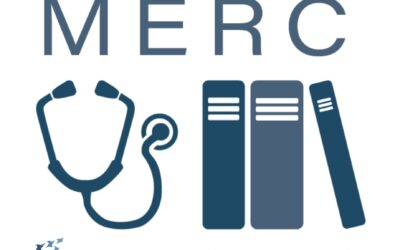
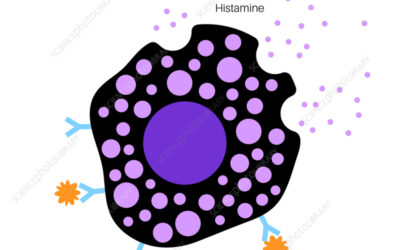

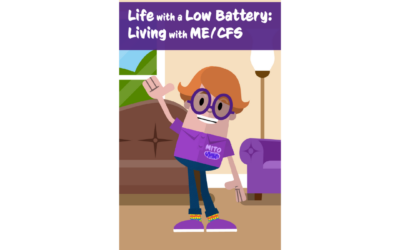

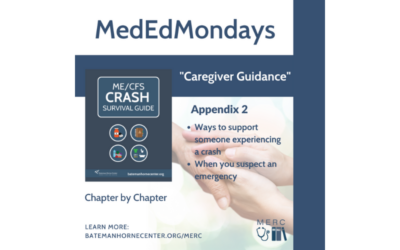
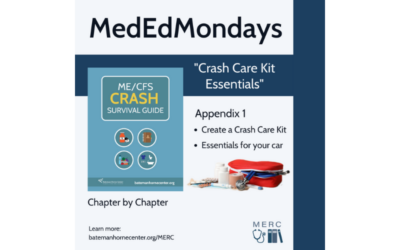
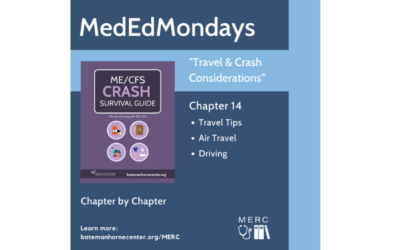
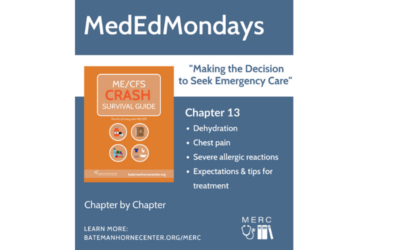
 Lucinda Bateman, MD, is a renowned clinician, researcher, and educator. Her Johns Hopkins University Medical School training instilled an approach to care that she has employed throughout her career - the patient comes first and the unknown or unexplained does not equate to a lack of proper and compassionate care. Since starting her own practice in 2000, she has served on six boards or committees, been the principal investigator for 45 studies, authored/coauthored 40 journal articles, served as adjunct instructor and adjunct assistant professor in the University of Utah Departments of Preventative Medicine, Internal Medicine, and Anesthesiology, and lectured around the world.
Lucinda Bateman, MD, is a renowned clinician, researcher, and educator. Her Johns Hopkins University Medical School training instilled an approach to care that she has employed throughout her career - the patient comes first and the unknown or unexplained does not equate to a lack of proper and compassionate care. Since starting her own practice in 2000, she has served on six boards or committees, been the principal investigator for 45 studies, authored/coauthored 40 journal articles, served as adjunct instructor and adjunct assistant professor in the University of Utah Departments of Preventative Medicine, Internal Medicine, and Anesthesiology, and lectured around the world.